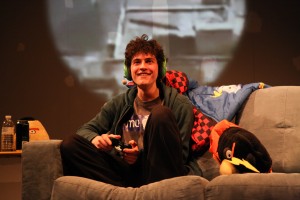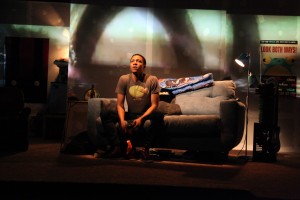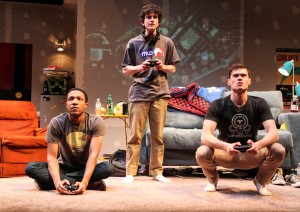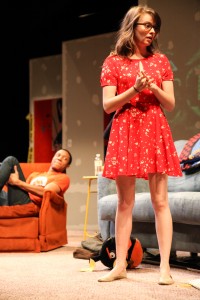SCRIPT ABOUT VIDEO GAME USAGE NEEDS FIXES
Early in Leveling Up at Steppenwolf Theatre, professional gamer Ian (Clancy McCartney) makes it clear that he prefers playing video games all day rather than going out in the real world; games, he says, give him “epic wins.” Perhaps a reference to Jane McGonigal’s book Reality is Broken: Why Games Make Us Better and How They Can Change the World, Ian argues that most people don’t find a feeling of satisfaction or happiness in their day jobs, whereas video games provide an outlet that lets him be someone else.
Non-gamer Jeannie (Carolyn Braver) responds that “Getting a girlfriend is an epic win,” and any defense of video gaming ends. The rest of the play, which is part of the Steppenwolf for Young Adults series, feels like a school presentation’”albeit with high production values’”about the dangers of video game addiction. Put down those controllers, kids; if you don’t, you’re going to wind up a miserable loser.
The show takes place entirely in an apartment shared by three obsessive gamers: the particularly skilled and antisocial Ian; the stupid pretty boy Zander (JJ Phillips); and the affable peacemaker Chuck (Jerry MacKinnon), who quietly pines for Zander’s girlfriend, Jeannie. Conflict erupts when Zander sells one of Ian’s in-game items to try to make rent and, in a bid for more money, Ian gets a job controlling combat drones for the NSA.
The production’s biggest weakness is Deborah Zoe Laufer’s incredibly preachy script, which has all the performers struggling to make their lines sound credible. No one has a harder task than Braver, who as the one woman in the cast is of course the non-gaming outsider, a straight-A psychology student who inexplicably started dating Zander after meeting him at RadioShack. She’s constantly nagging the other characters to better themselves while freaking out that the lure of playing video games keeps her from studying or going to class.
Why is Jeannie spending so much time with her boyfriend’s roommates when he’s not around? Why is she dating such an obvious loser in the first place? Her actions raise questions about her own self-esteem and problems, but the character remains unexamined, just a mouthpiece for Laufer’s criticisms of gaming culture and drone warfare.
The play does have some strong scenes, primarily those that showcase McCartney and MacKinnon’s acting skills. There’s a surprisingly sweet moment where Chuck uses a game inspired by The Sims to share his feelings for Jeannie; and Ian’s acidic dressing down of Jeannie and Zander’s relationship is the evening’s highlight.
Director Hallie Gordon shows the power of position in these scenes, effectively building tension simply by having characters move together on a couch or retreat across the room. Less successful is her use of projections to show the games being played. It’s a distracting effect since some games have no visuals at all, while others are fully fleshed out, complete with noisy explosions. In one particularly odd case the players are engaged in playing what on the screen appears to be a static map while raving about how good the graphics are.
Scenic designer Brian Bembridge’s set might be the most realistic part of the play: The apartment’s industrial carpet and poster-covered plaster walls clearly indicate that the gaming equipment costs more than everything else combined. His costuming choices are also great, marking the passage of time by having characters change between different nerdy shirts, or just having Ian don a different color of sweatpants.
When other characters try to persuade Ian that he needs to socialize more, he talks about his in-game friends and how well they know him. Later on he tries to find solace from one of them and is rebuffed, discovering just how shallow a relationship really is when based on teaming up to shoot down virtual enemies. When McCartney sits alone in the dark, it’s a particularly poignant observation about the isolation that electronic communication can produce. If there were more scenes like this, Leveling Up‘s criticisms of video games could have resonated with its target audience. Instead the message falls flat, weighed down by far too many game-bashing speeches.
Leveling Up
Steppenwolf Theatre Company
Steppenwolf’s Downstairs Theatre, 1650 N. Halsted
scheduled to end on March 15, 2014
for tickets, call 312-335-1650
or visit www.steppenwolf.org
for info on this and other Chicago Theater,
visit http://www.TheatreinChicago.com










